Bahrain Petrochemical Industry: Role Model for Environmental Protection and Safety
Bahrain Sector Analysis
Special Story Behind Forming Gulf Petrochemical Industries Company with Excellent Track Record for Safety and Environmental Protection
GPIC’s Bottom Line: “We are debt-free and cash-rich, so it’s a tough period,” says GPIC’s General Manager
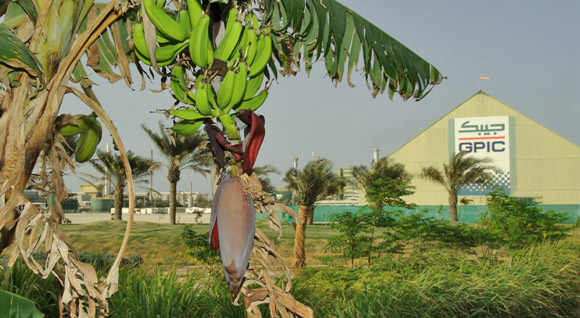
The Remarkable Story of Gulf Petrochemical Industries Company (GPIC)
“We do not see ourselves as a normal company.”
GPIC sees itself, and has been judged by numerous public and professional bodies, to be “the best petrochemical company in the world in its class of business” and “one of the best operating petrochemical complexes in the world.” According to its general manager, A. Rahman A. Hussein Jawahery,
“We do not see ourselves as a normal company”
“It is the benchmark and role model for sustainable development with sound financial performance, the best safety record in any petrochemical complex in the world, and one of the best complexes caring for the environment and promoting environmental awareness for sustainable development in Bahrain, regionally and internationally.”
How it came to be this way, and what this bold claim means, has an interesting story behind it. As Jawahery says, “I have always maintained that GPIC has had an interesting past and a glorious present and a very promising future.”
Like most success stories, it begins in adversity. Jawahery tells of the sad beginning this way: “When our plants went on stream in 1985-86 the global petrochemical prices had crashed and the netbacks were not adequate to cover our costs of production; more importantly, we were not in a position to service our debts.”
But this turned out to be a blessing in disguise, says Jawahery; for, “the bankers imposed strict terms for re-structuring the debt. GPIC was required to operate and maintain the plants at optimum levels for as long an uninterrupted period as possible to keep unit (per tonne) production costs as low as possible.”
The pressure of possible failure at the very inception of GPIC was a test, says Jawahery, of the organization’s resolve. As a result, the company leadership developed an “obsession” for doing everything perfectly, and it is this early-developed obsession that has guided the company to its present success. As Jawahery explains: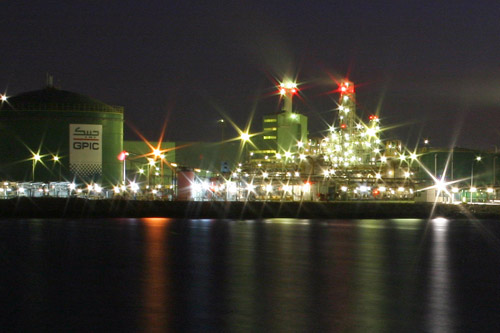
“This obsession with continual improvement in every sphere of activity has led to GPIC becoming a world class petrochemical producer that is rated very highly and regarded as a role model by its peers, customers, vendors, original equipment manufacturers, licensors, and consultants, but more importantly by the people and governments of Bahrain and the GCC.”
Let us now recount the ways that GPIC has earned its accolades as the “best petrochemical company in the world in its class of business,” and “one of the best operating petrochemical complexes in the world.”
GPIC’s Bottom Line: “We are debt-free and cash-rich, so it’s a tough period,” says GPIC’s General Manager
First, let’s talk about the bottom line profitability of the company—its assets and liabilities, and its profit and loss statement. GPIC has been so financially successful that Jawahery, GPIC’s general manager, even jokes about it: “We are debt-free and cash-rich, so it’s a tough period, but we are very well placed to deal with the current situation.”
Jawahery adds that GPIC has major expansion plans to build upon its success, but with high profits, high asset values, and no liabilities, GPIC has attained the position that it can finance itself. Says jawahery:“We have a strong capability to finance ourselves, or if it exceeds that, then GPIC is a very strong proposition for banks looking for low risk financing,”
“We are debt-free and cash-rich, so it’s a tough period,”
The bottom line is described by Jawahery this way: “Over 25 years of production, we have managed to pay off all our debts…. We make significant profits thanks to our safe and sustainable operations; year in and year out we run at 100% capacity.
We market our products through our shareholders, which gives us access to the best markets worldwide. Profits are either invested in our facilities – which are top-of-the-line, and I challenge anyone to demonstrate that our plant is not the most advanced of its type in the world – or they are distributed to our shareholders.
Not many other companies: can claim to have repaid all its investors and all its debts; goes into each year with no liabilities at the end, and can even finance its own investment for expansion.
But the bottom line is only the beginning of GPIC’s story of excellence.
GPIC’s Philosophy of Excellence: “We do not see ourselves as a normal company.”
According to Jawahery, “We do not see ourselves as a normal company, with only the bottom line to play. Our strategy has always been to be successful both as a business entity in the normal sense and as a social organization,” which he explains as follows:
“There are two key issues for Bahrain. Human resources are particularly important for the Bahraini leadership as well as our shareholders. The second issue is the environment. Bahrain is a small country, and having a petrochemical industry, though it may be safe and reliable, is perceived as harmful towards the environment. As a fertilizer industry, of course, we position ourselves as helping the environment.
“
These two key issues set the stage for the special form of excellence that GPIC has achieved.
GPIC’s Record for Safety and Health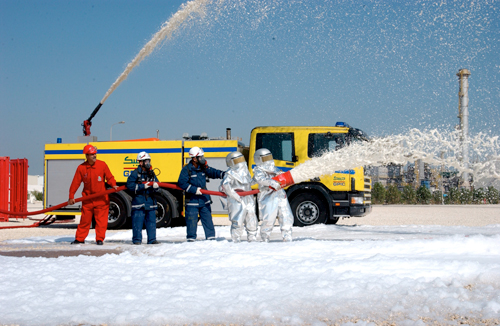
As part of its obsession for perfection, GPIC has always placed the safety of its employees in the production process as its first and highest priority. According to Jawahery,
“Safety assumes special importance in the petrochemicals industry due to the nature of processes that employ flammable gases, high pressures, electrical risks and the presence of high-speed machines. For this purpose, GPIC employs a stringent risk management policy that has resulted in achieving more than 8 million hours without any lost-time accidents. GPIC’s record of achievements in safety is outstanding by all standards.”
The success of GPIC’s program of employee safety is well attested by the numerous safety awards it has received:
-
Eight consecutive golden awards from the Royal Society for the Prevention of Accident (RoSPA) U.K.
-
In 2001, GPIC won the international sector award for the petrochemical industry from RoSPA.
-
GPIC won the prestigious Sir George Earle Trophy from RoSPA in 2005, which is awarded to an organization for the most outstanding Performance in Occupational Safety and Health worldwide. It is notable that GPIC has become the first organization outside Europe and North America to be awarded with this prestigious Trophy. In the final round of this award, GPIC competed with international giants such as Shell, Toyota and General Electric.
-
In 2008, GPIC was awarded the Robert Campbell Safety Award from the National Safety Council, USA in recognition for the company’s strict adherence to and constant developments of its occupational health and safety systems.
-
The company also won the highly acclaimed International Safety award from the British Safety Council; and
-
The 2008 Excellence Award in Chemical Sector for Occupational Health and Safety from the Royal Society for the Prevention of Accidents (RoSPA) UK.
In addition to safety, GPIC also devotes considerable efforts to assure its employees health—above and beyond what almost any other company provides. According to the Bahrain National Oil and Gas Authority
Safety assumes special importance in the petrochemicals industry due to the nature of processes that employ flammable gases, high pressures, electrical risks and the presence of high-speed machines. For this purpose, GPIC employs a stringent risk management policy that has resulted in achieving more than 8 million hours without any lost-time accidents. GPIC’s record of achievements in safety is outstanding by all standards.”
-
GPIC Complex is supported by a modern health centre managed by an experienced doctor, assisted by qualified nurses and equipped with the stat of the art medical equipment. The centre provides its services 24 hours a day throughout the week. These services include primary care, first aid and periodical checkups for all employees.
-
A large number of the company staff has also been trained as qualified first aiders to assist the health centre when needed. Furthermore, the centre in coordination with the labour union regularly organizes blood donation campaigns to supplement reserves at the Blood Bank of the Ministry of Health.
-
The Management has also appointed a Health Committee which regularly inspects the canteen premises and other food outlets at the complex to ensure that highest level of hygiene is maintained. The Committee also organizes a number of lectures annually to cover various health issues.
-
The Management has also formed a number of committees such as the Safety Committee, Health Committee, Environment Committee, Training and Development committee, productivity enhancement committee, personal cases committee and many others. All these committees work consistently with each other to achieve the set objectives.
-
The GPIC leadership is fully committed in its endeavors to synthesize the best from world safety, health, and quality standards to build a truly robust management regime. The company’s management systems are certified to ISO-9001:2000 quality standard, ISO-14001 environmental standard and the Occupational Health and Safety Management System’s OHSAS-18001 standard. The company has also acquired the ISO-27001 certification also for its Information Technology Security Management System.
Environmental Protection
One of the most important reasons that GPC is regarded as one of the best petrochemical complexes in the world is its record of concern for the environment and environmental protection. According to Jawahery, GPIC has become the “benchmark and role model for sustainable development…and one of the best complexes caring for the environment and promoting environmental awareness for sustainable development in Bahrain, regionally and internationally.”
The proof of this lies in its superior environmental projects, which include:
-
Charity Garden: GPIC launched its environmental programme in March 1992 with a Charity Garden. Built on an area of 1,500 m2, this garden yielded more than 14 tonnes of vegetables and fruits that were donated to charities and families in need. Recently, Fruit trees and date palms have also been added to enhance the output of the Charity Garden.
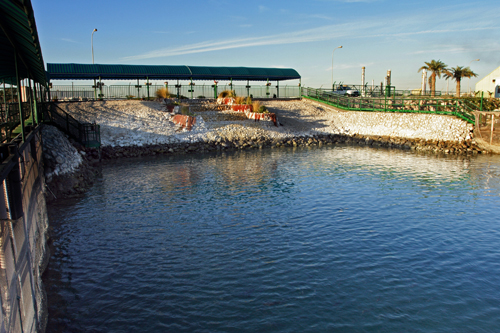
-
Fish Farm: With the aim of demonstrating environmental accountability, setting a good example to other industries and replenishing dwindling fish reserves in regional waters, the company embarked on constructing a fish farm close to the sea water outlet in November 1996. Different kinds of tropical fish to found in Bahrain’s waters, like Black Sea Bream (Shim), Mullet (Meid) and Rabbit fish (Saffee) are being reared and bred in the fish farm so that their growth can take place in a congenial atmosphere. Later these fish are released into the sea. GPIC management also ensures that some of the fish harvested go to charity.
-
Bird Sanctuary: The evident improvement in the environment around GPIC has encouraged GPIC’s management to further enhance its special focus on the surroundings and especially Bahrain’s bird life. The bird sanctuary was commissioned on 9th September 2001 where a small nesting area and fresh pond have been created for the birds to enjoy a natural habitant with a view to maintaining striving to improve the environment around the GPIC complex.
-
Herbal and Medicinal Plants Garden: To demonstrate the eco friendliness of its operations, GPIC has implemented a number of projects inside and outside its complex, the latest of which is the Herbal and Medical Plants Garden inaugurated on 9th May 2005 under the patronage of His Highness Shaikh Abdullah bin Hamad Al Khalifa, Governor of the Southern Governorate and Chairman of the Public Commission for the Protection of Marine Resources, Environment and Wildlife. Covering an area of 1200m2, this innovative project was launched with the prime objective of preserving indigenous herbs and plants that were once used by inhabitants to treat various illnesses. The garden currently encompasses 20 types of herbs and shrubs. This garden has also become a very useful platform for researchers, school students and dignitaries from which to benefit. These efforts have contributed greatly to GPIC winning several accolades including the GCC Environmental Award for the Best Establishment Adhering to Environmental Legislations.
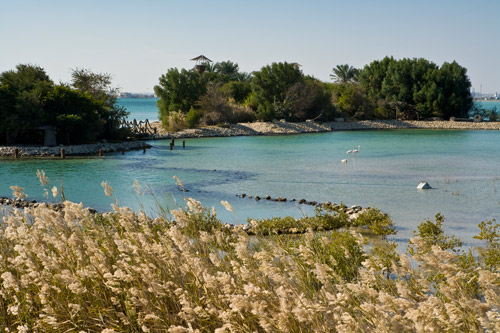
-
H.H Shaikha Sabika bint Ibrahim Al Khalifa Aromatic Plants Garden: In March 2009 Her Highness Shaikha Sabika bint Ibrahim Al Khalifa wife of His Majesty the King opened the Aromatic Plants Garden at the GPIC Complex bearing her name. This is a unique garden mainly designed to feature all the perfumed aromatic plants and herbs in the Kingdom.
-
Carbon Dioxide Recovery: In 2008, GPIC became one of the first Petrochemical companies in the Middle East to embark on the 450 tons/day Carbon Dioxide Recovery (CDR) Project. The project was initiated to cut down Green House gas emissions and improve the overall efficiency of resources by having additional production of Methanol and Urea at its complex.
-
International Dilmun Award : In 2007, The International Dilmun Award was launched. This environmental award is sponsored by GPIC as part of the Royal Society for the Prevention of Accidents (RoSPA) awards programme. The name ‘Dilmum’ was given to reflect the history of Bahrain and in recognition of GPIC’s commitment and contribution to safety, health and the environment